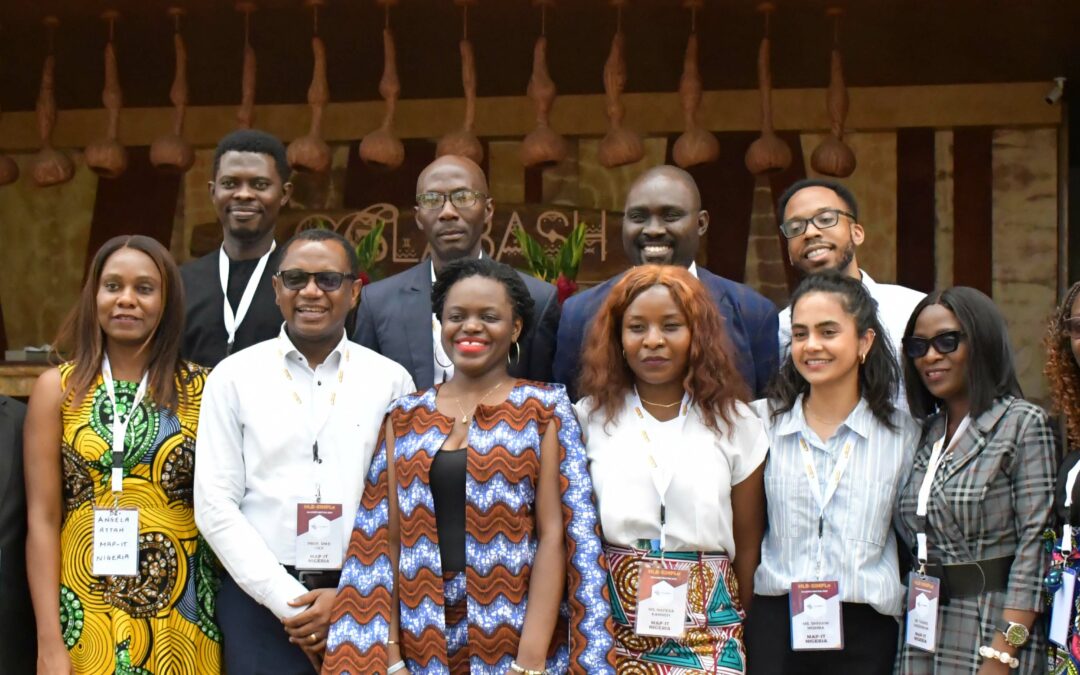Members of the MAP-IT research team gather in Uganda at the Alliance Annual Meeting in 2023. Front row, left to right: Dr. Anyiekere Ekanem, Dr. Angela Attah, Dr. Dike Ojji, Dr. Angela Aifah, Nafesa Kanneh, Shivani Mishra, Dr. Adeola Taiwo, Deborah Onakomaiya. Back row, left to right: Daniel Henry, Anthony Hassan, Samuel Osagie, Calvin Colvin.
(PHOTO: April Houston (RCC)/Washington University in St. Louis).
Public health practitioners and researchers are trained to identify problems, analyze their causes, and find ways to solve them. This approach can be very effective when the problems are straightforward. However, for those of us who work within complex health systems, focusing on problems may not always lead us to effective and sustainable solutions.
Realizing this, researchers from the HLB-SIMPLe MAP-IT project set out to understand the health system serving people living with HIV in Akwa Ibom, Nigeria by asking insiders and stakeholders about its strengths, as opposed to focusing on deficits and challenges. Their findings were published recently in the PLOS ONE journal.
In many parts of Nigeria, including Akwa Ibom, there are not enough trained physicians to meet the needs of the large and growing population. The Nigerian government set out to improve access to essential health services in 2014 by creating a policy that promoted task-sharing: allowing nurses and other non-physician health workers to manage certain health conditions for uncomplicated cases, freeing up physicians to focus on those needing more advanced clinical care. Task-sharing (also called task-shifting) has been used widely for chronic disease management, including HIV and cardiovascular disease, in low-resource settings.
When someone with HIV visits a primary health center in Nigeria, they may see a non-physician health worker authorized to dispense antiretroviral medications (ARVs), initiate treatment for acute symptoms if needed, and conduct routine physical examinations. However, most existing HIV services are not designed to provide other care, including identifying patients with increased risk of hypertension, linking them to effective monitoring and management, and ensuring they continue receiving these services over time. As life expectancy continues to improve for people living with HIV in Africa and they reach their senior years, it is increasingly important that health providers who see people living with HIV are equipped to look for and treat hypertension and other chronic conditions.
The MAP-IT research project is exploring ways to improve the use of task-sharing strategies for hypertension care (TASSH) in HIV clinics in Akwa Ibom, training retired nurses to then train current nurses to manage hypertension in HIV patients (a processed referred as the ‘train the trainer’ model). The research team sought to learn how those most familiar with the health system felt about this approach to care. Led by Dr. Juliet Iwelunmor, the team interviewed 24 people, asking about their perceptions of TASSH, its potential impact on the workflow of staff, patient experience, and clinical encounters. Here are some of their comments:
“You will feel very free, because someone that you have been meeting, over the years, is the same person that you can actually say, ‘this is what is happening to me, this is how it is,’ and the person knows your history already. So they will know how to address other related health issues.”
“I’m seeing [more] benefits than barriers or challenges. Benefit number one: the nurses in the community, they are the people that have a good rapport with people living with HIV. Thus, they are close to the patient, and we have the techniques of ensuring that each visits the hospital.”
“[Task-shifting] will lessen burdens on the professional physicians, and it will also make them more efficient. They will also have time to concentrate on very critical cases. It will also reduce the time patients will spend in the hospital.”
Once the interviewee responses were analyzed, researchers identified three perceived overarching assets of using TASSH in HIV clinics:
- extending the continuity of care among people with HIV
- empowering health care providers
- enhancing staff motivation and stakeholder engagement.
The research team summarized their findings in a policy brief that explained the implications of what they learned, including recommendations for how policymakers could leverage the strengths identified through this research to continue to improve hypertension care in HIV clinics around the country. Promoting task-shifting by recruiting more retired nurses to be trainers and building hypertension training into existing nurse and community health worker education programs was at the top of the list.
The MAP-IT team will continue checking in with stakeholders regularly as their larger research project progresses to stay aware of their perspectives and ideas related to TASSH, as they recognize that their input and continued engagement is crucial to the project’s success.

